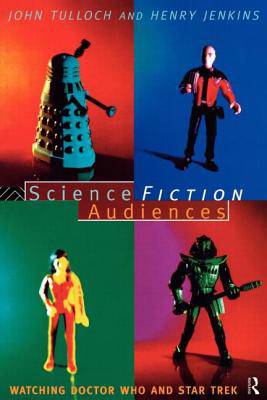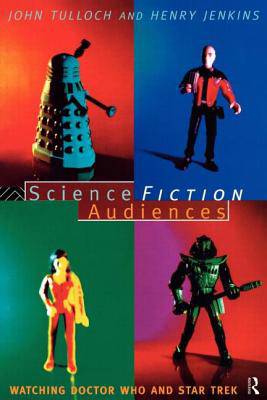
- Retrait gratuit dans votre magasin Club
- 7.000.000 titres dans notre catalogue
- Payer en toute sécurité
- Toujours un magasin près de chez vous
- Retrait gratuit dans votre magasin Club
- 7.000.0000 titres dans notre catalogue
- Payer en toute sécurité
- Toujours un magasin près de chez vous
Description
Science Fiction Audiences examines the astounding popularity of two television "institutions" - the series Doctor Who and ^Star Trek. Both of these programmes have survived cancellation and acquired an following that continues to grow. The book is based on over ten years of research including interviews with fans and followers of the series. In that period, though the fans may have changed, and ways of studying them as "audiences" may have also changed, the programmes have endured intact, with Star Trek for example now in its fourth television incarnation.
John Tulloch and Henry Jenkins dive into the rich fan culture surrounding the two series, exploring issues such as queer identity, fan meanings, teenage love of science fiction, and genre expectations. They encompass the perspectives of a vast population of fans and followers throughout Britain, Australia and the US, who will continue the debates contained in the book, along with those who will examine the historically changing range of audience theory it presents. and continue to attract a huge community of fans and followers. Doctor Who has appeared in nine different guises and Star Trek is now approaching its fourth television incarnation.Science Fiction Audiences examines the continuing popularity of two television 'institutions' of our time through their fans and followers.
Through dialogue with fans and followers of Star Trek and Dr Who in the US, Britain and Australia, John Tulloch and Henry Jenkins ask what it is about the two series that elicits such strong and active responses from their audiences. Is it their particular intervention into the SF genre? Their expression of peculiarly 'American' and 'British' national cultures. Their ideologies and visions of the future, or their conceptions of science and technology?
Science Fiction Audiences responds to a rich fan culture which encompasses debates about fan aesthetics, teenage attitudes to science fiction, queers and Star Trek, and ideology and pleasure in Doctor Who. It is a book written both for fans of the two series, who will be able to continue their debates in its pages, and for students of media and cultural studies, offering a historical overview of audience theory in a fascinating synthesis of text, context and audience study.
Spécifications
Parties prenantes
- Auteur(s) :
- Editeur:
Contenu
- Nombre de pages :
- 308
- Langue:
- Anglais
- Collection :
Caractéristiques
- EAN:
- 9780415061414
- Date de parution :
- 13-04-95
- Format:
- Livre broché
- Format numérique:
- Trade paperback (VS)
- Dimensions :
- 156 mm x 233 mm
- Poids :
- 548 g

Les avis
Nous publions uniquement les avis qui respectent les conditions requises. Consultez nos conditions pour les avis.






